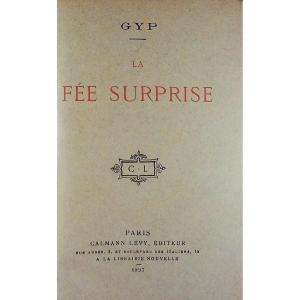"Gyp - The Surprised Fairy. Calmann Lévy, 1897, Full Purple Morocco Binding Signed Bézard."
GYP - The Surprised Fairy. Paris, Calmann Lévy, 1897; in-12, 275 pp., full purple morocco binding signed Bézard, spine with 5 raised bands, interior binding, preserved cover, gilded head. Gyp, great-grandniece of Mirabeau, whose real name is Sibylle Marie-Antoinette Gabrielle Riquetti de Mirabeau, is the last of the Riquetti de Mirabeau. She grew up in Nancy in a royalist family on Place de la Carrière, in a building owned by her family. She married Count Roger de Martel de Janville on December 2, 1867 and left Nancy for Neuilly-Sur-Seine. She began publishing texts from 1877 under the pseudonym Gyp. Although friends with Anatole France, Gyp took a position against Alfred Dreyfus, which did not prevent her from receiving Marcel Proust in her living room. His works are marked by the anti-Semitism of good French society of the time and exacerbated by the Dreyfus affair. She welcomed into her salon the most famous artists of her time such as Robert de Montesquiou, Marcel Proust, Edgar Degas, Maurice Barrès, Anatole France, Paul Valéry, Alphonse Daudet, Jean-Louis Forain, Auguste Vimar, Lucien Corpechot and Edgar Itches. She is buried in Neuilly-Sur-Seine. Her style is very particular: Gyp is a great dialogue writer with a certain sense of humor. She happily makes fun of good society, but she also sometimes excels at reproducing popular speech or accents (German or others). She manages to situate an action with a fairly great economy of means, taking inspiration from the theater she sometimes places at the beginning of a chapter indications of places or scenes which allow one to enter directly into a dialogue or an action. She makes her dialogues very lively by often separating her sentences with three points, sometimes even with exclamation points, which has the advantage of both giving rhythm to the story and leaving room to underline ulterior motives, and can - also be to reproduce the particular way that everyone has in their intimate speech.



